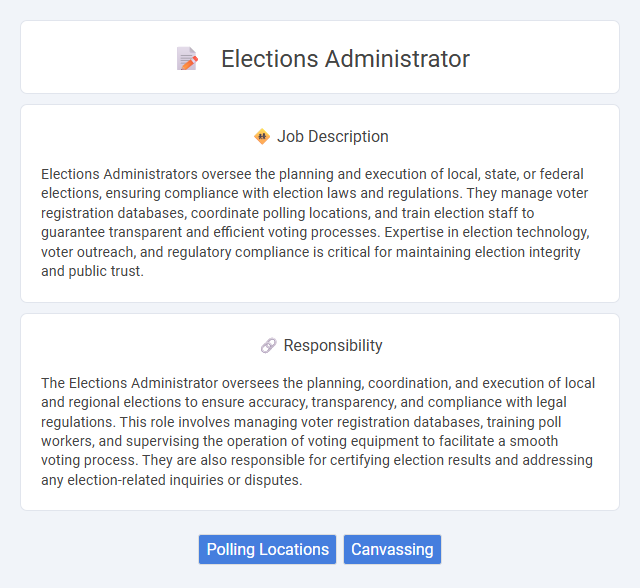
Elections Administrators oversee the planning and execution of local, state, or federal elections, ensuring compliance with election laws and regulations. They manage voter registration databases, coordinate polling locations, and train election staff to guarantee transparent and efficient voting processes. Expertise in election technology, voter outreach, and regulatory compliance is critical for maintaining election integrity and public trust.
Candidates with strong organizational skills and attention to detail are likely suitable for the Elections Administrator role, as it demands precise management of voter information and election processes. Individuals comfortable working under pressure and adhering to strict regulations may find this position aligns with their abilities. Those who prefer routine tasks without the responsibility of ensuring electoral integrity might not be the best fit for this job.
Qualification
Elections Administrators must possess strong organizational and leadership skills, typically supported by a bachelor's degree in public administration, political science, or a related field. Certifications such as Certified Elections/Registration Administrator (CERA) enhance credibility and demonstrate expertise in election laws and procedures. Experience with voter registration systems, election software, and an in-depth understanding of local, state, and federal election regulations are essential for effective management of election processes.
Responsibility
The Elections Administrator oversees the planning, coordination, and execution of local and regional elections to ensure accuracy, transparency, and compliance with legal regulations. This role involves managing voter registration databases, training poll workers, and supervising the operation of voting equipment to facilitate a smooth voting process. They are also responsible for certifying election results and addressing any election-related inquiries or disputes.
Benefit
Elections Administrators likely benefit from stable government employment with opportunities for professional growth and skill development in election management. They may gain valuable experience in coordinating logistics, ensuring voter accessibility, and maintaining election integrity. The role probably offers a sense of civic contribution and the chance to influence democratic processes at local or regional levels.
Challenge
Elections Administrators likely face the challenge of ensuring accurate and secure voting processes amid evolving technologies and regulatory requirements. They probably need to manage logistical complexities while maintaining voter confidence and compliance with legal standards. Balancing transparency with security could be a significant ongoing difficulty in this role.
Career Advancement
Elections Administrators play a critical role in managing electoral processes, ensuring voter registration accuracy, and coordinating polling activities. Gaining expertise in election laws, data management, and technology integration can lead to career advancement into senior roles such as Chief Election Officer or Director of Elections. Continued professional development and certification from organizations like the Election Center enhance leadership opportunities and influence in public administration.
Key Terms
Polling Locations
Elections Administrators manage the setup and organization of polling locations to ensure accessibility, security, and compliance with election laws. Their responsibilities include coordinating site selection, verifying voting equipment functionality, and training poll workers to support a smooth voting process. Effective management of polling locations directly impacts voter turnout and the accuracy of election results.
Canvassing
Elections Administrators oversee the canvassing process to ensure accurate verification and certification of election results. They coordinate audits, review vote tallies, and resolve discrepancies in counting to uphold election integrity. Expertise in local and state election laws is essential for managing timely, compliant canvassing procedures.
 kuljobs.com
kuljobs.com